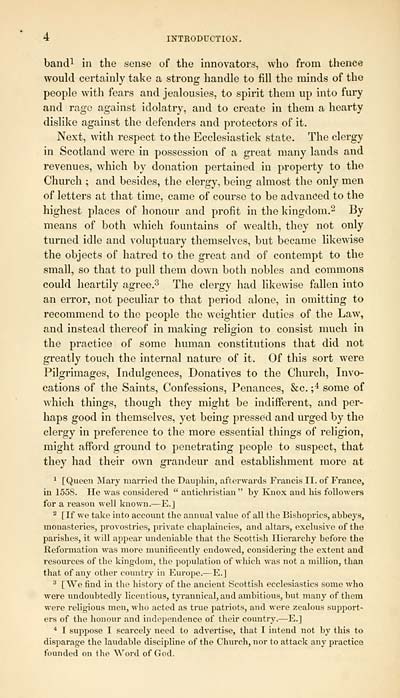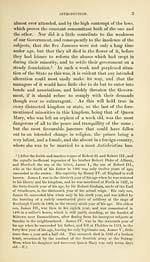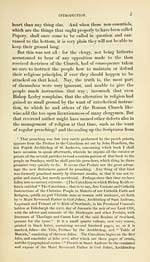Spottiswoode Society > History of the affairs of the Church and State of Scotland from the beginning of the reformation to the year 1568 > Volume 1
(140) Page 4
Download files
Complete book:
Individual page:
Thumbnail gallery: Grid view | List view

4 INTRODUCTION.
band 1 in the sense of the innovators, who from thence
would certainly take a strong handle to fill the minds of the
people with fears and jealousies, to spirit them up into fury
and rage against idolatry, and to create in them a hearty
dislike against the defenders and protectors of it.
Next, with respect to the Ecclesiastick state. The clergy
in Scotland were in possession of a great many lands and
revenues, which by donation pertained in property to the
Church ; and besides, the clergy, being almost the only men
of letters at that time, came of course to be advanced to the
highest places of honour and profit in the kingdom. 2 By
means of both which fountains of wealth, they not only
turned idle and voluptuary themselves, but became likewise
the objects of hatred to the great and of contempt to the
small, so that to pull them down both nobles and commons
could heartily agree. 3 The clergy had likewise fallen into
an error, not peculiar to that period alone, in omitting to
recommend to the people the weightier duties of the Law,
and instead thereof in making religion to consist much in
the practice of some human constitutions that did not
greatly touch the internal nature of it. Of this sort were
Pilgrimages, Indulgences, Donatives to the Church, Invo-
cations of the Saints, Confessions, Penances, &c. ; 4 some of
which things, though they might be indifferent, and per-
haps good in themselves, yet being pressed and urged by the
clergy in preference to the more essential things of religion,
might afford ground to penetrating people to suspect, that
they had their own grandeur and establishment more at
1 [Queen Mary married the Dauphin, afterwards Francis II. of France,
in 155S. He was considered " antichristian " by Knox and his followers
for a reason well known. — E.]
2 [If we take into account the annual value of all the Bishoprics, abbeys,
monasteries, provostries, private chaplaincies, and altars, exclusive of the
parishes, it will appear undeniable that the Scottish Hierarchy before the
Reformation was more munificently endowed, considering the extent and
resources of the kingdom, the population of which was not a million, than
that of any other country in Europe. — E.]
a [We find in the history of the ancient Scottish ecclesiastics some who
were undoubtedly licentious, tyrannical, aud ambitious, but many of them
were religious men, who acted as true patriots, and were zealous support-
ers of the honour and independence of their country. — E.]
4 I suppose I scarcely need to advertise, that I intend not by this to
disparage the laudable discipline of the Church, nor to attack any practice
founded on the Word of God.
band 1 in the sense of the innovators, who from thence
would certainly take a strong handle to fill the minds of the
people with fears and jealousies, to spirit them up into fury
and rage against idolatry, and to create in them a hearty
dislike against the defenders and protectors of it.
Next, with respect to the Ecclesiastick state. The clergy
in Scotland were in possession of a great many lands and
revenues, which by donation pertained in property to the
Church ; and besides, the clergy, being almost the only men
of letters at that time, came of course to be advanced to the
highest places of honour and profit in the kingdom. 2 By
means of both which fountains of wealth, they not only
turned idle and voluptuary themselves, but became likewise
the objects of hatred to the great and of contempt to the
small, so that to pull them down both nobles and commons
could heartily agree. 3 The clergy had likewise fallen into
an error, not peculiar to that period alone, in omitting to
recommend to the people the weightier duties of the Law,
and instead thereof in making religion to consist much in
the practice of some human constitutions that did not
greatly touch the internal nature of it. Of this sort were
Pilgrimages, Indulgences, Donatives to the Church, Invo-
cations of the Saints, Confessions, Penances, &c. ; 4 some of
which things, though they might be indifferent, and per-
haps good in themselves, yet being pressed and urged by the
clergy in preference to the more essential things of religion,
might afford ground to penetrating people to suspect, that
they had their own grandeur and establishment more at
1 [Queen Mary married the Dauphin, afterwards Francis II. of France,
in 155S. He was considered " antichristian " by Knox and his followers
for a reason well known. — E.]
2 [If we take into account the annual value of all the Bishoprics, abbeys,
monasteries, provostries, private chaplaincies, and altars, exclusive of the
parishes, it will appear undeniable that the Scottish Hierarchy before the
Reformation was more munificently endowed, considering the extent and
resources of the kingdom, the population of which was not a million, than
that of any other country in Europe. — E.]
a [We find in the history of the ancient Scottish ecclesiastics some who
were undoubtedly licentious, tyrannical, aud ambitious, but many of them
were religious men, who acted as true patriots, and were zealous support-
ers of the honour and independence of their country. — E.]
4 I suppose I scarcely need to advertise, that I intend not by this to
disparage the laudable discipline of the Church, nor to attack any practice
founded on the Word of God.
Set display mode to: Large image | Transcription
Images and transcriptions on this page, including medium image downloads, may be used under the Creative Commons Attribution 4.0 International Licence unless otherwise stated. ![]()
| Permanent URL | https://digital.nls.uk/79598468 |
|---|
| Description | Volume I. |
|---|---|
| Attribution and copyright: |
|

